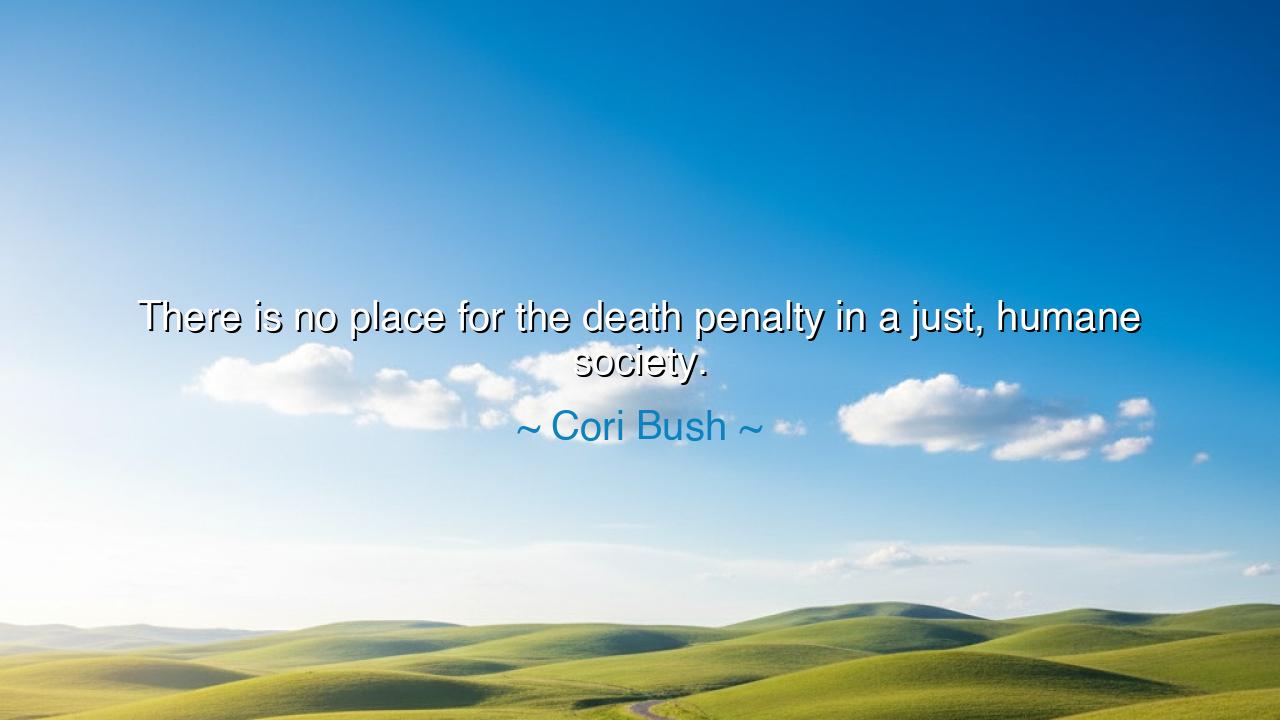
There is no place for the death penalty in a just, humane






“There is no place for the death penalty in a just, humane society.” Thus declares Cori Bush, a voice of compassion and courage in an age still wrestling with the shadow of vengeance. Her words strike like a bell in a silent hall — clear, resonant, and unyielding. In them lives not only a political conviction, but a moral vision — a plea for humanity to rise above its ancient thirst for retribution. She reminds us that justice without mercy becomes cruelty, and that a truly humane society must measure its strength not by its power to destroy, but by its power to forgive.
The origin of this belief lies deep in the evolution of the human conscience. In the ancient world, justice was bound to blood. An eye for an eye, a life for a life — this was the law that governed tribes and empires alike. To kill the killer seemed natural, even righteous. But as ages passed, as the soul of man grew weary of the endless circle of death, voices arose — prophets, philosophers, and reformers — who saw that true justice does not come from inflicting pain, but from breaking the chain of it. Cori Bush, standing upon the shoulders of such wisdom, proclaims that civilization must move forward, not backward — that the mark of moral progress is not how we punish, but how we preserve life.
Consider the example of Mahatma Gandhi, who lived in a land torn by oppression and yet refused to meet violence with violence. When asked about vengeance, he said, “An eye for an eye makes the whole world blind.” He understood what Bush now echoes: that killing the guilty does not heal the wound; it deepens it. Every act of state-sanctioned death teaches the people that some lives can be thrown away — and in that teaching, the soul of the nation is diminished. For justice that kills cannot be humane, and mercy that hesitates is not justice.
History, too, bears witness to the fallibility of human judgment. How many have been executed in error, their innocence discovered only when the grave could not release them? The story of George Stinney Jr., a fourteen-year-old boy executed in 1944 in South Carolina, stands as a scar upon the conscience of humankind. Condemned in haste, denied defense, killed by the electric chair — only decades later was his name cleared. What society can call itself just when it kills a child for a crime he did not commit? What government can claim to be humane when it ends a life it cannot restore? Bush’s words are not an ideal — they are a demand that we awaken to our own moral blindness.
Yet her declaration is not only about the condemned — it is about us, the living. For when a society chooses death, it shapes the spirit of its people. To endorse the death penalty is to accept that cruelty has a rightful place among us, that vengeance may be dressed as virtue. But to abolish it — to spare even those who have done grave wrong — is to affirm that mercy is stronger than hatred, and that every soul, however lost, still bears the image of humanity. Such a belief requires courage — the courage to forgive when the heart cries for revenge, the courage to trust in the power of redemption.
Bush’s words carry the wisdom of ages and the defiance of prophets. She stands in the lineage of those who refused to let civilization be ruled by fear: Martin Luther King Jr., who called love the weapon of the strong; Nelson Mandela, who forgave his captors to heal a nation; and Dorothea Dix, who fought for the dignity of prisoners and the mentally ill. Each saw what Bush sees — that a just society cannot be built upon the ruins of mercy, that every life, even broken and guilty, carries sacred worth.
Lesson: Let us build a world where justice is guided by compassion, and mercy is not weakness but wisdom. Let us abolish cruelty disguised as law, and refuse to give death the power to define our values. Do not meet evil with evil, nor return pain for pain. Instead, be the generation that ends the cycle — that chooses restoration over retribution, healing over harm.
For as Cori Bush teaches, the measure of our civilization is not in how we punish the worst among us, but in how we honor the dignity that remains in all. A just and humane society is one that believes every life — even the most fallen — still has the right to live, to change, and to be seen as human. And when we uphold that belief, we become what humanity was always meant to be: merciful, courageous, and free.






AAdministratorAdministrator
Welcome, honored guests. Please leave a comment, we will respond soon